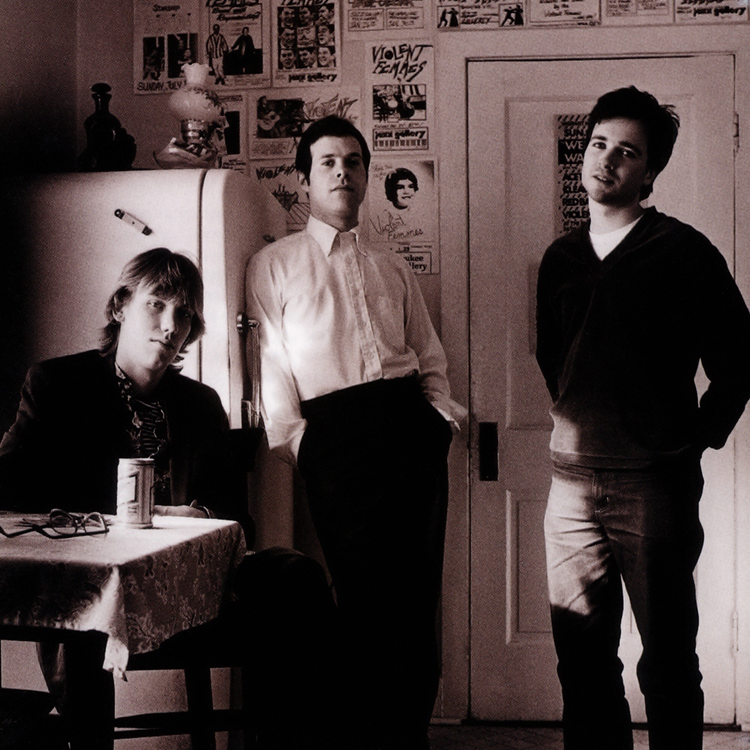

About Violent Femmes
The Violent Femmes story is a story about a phenomenon which occurs every once in a while in the so-called music scene. The Beatles, the Stones, the Byrds, the Velvets, the Stranglers,.. the Femmes. Who knows why these things happen?
One could consider them as a movement against all these beautiful things you can see every day (including their consequences): boredom of life, religious paradox, the absence of basic moral principles, wicked social influences on adolescent kids (teen psychosis), mechanical human actions and reactions (lacking spontaneity), twisted relationships, misleading – false appearances and statements, false flirt, etc. – you name it.
It’s a rage, a protest fueled by anger and angst, provocative and critical, stressed and frustrated – supported by music which ranges from country to psychedelic, so ordinary and yet so open to improvisation. The name of the band “Violent Femmes”, an innuendo on “femmes” (slang for: “wimps”), speaks for itself. Looks like it’s quite original to be a wimp after all, but hold on, it gets even better..
The Femmes originate from Milwaukee, Wisconsin, where they used to play in the streets in the early ’80. The band was made up of three members: Gordon Gano (vocals & guitar), Brian Ritchie (vocals & bass) and Victor DeLorenzo (vocals & percussion). It was on these streets where they were discovered by James Honeyman Scott (the Pretenders) who heard them playing in front of the Theatre were the Pretenders were holding a concert. After that discovery the Femmes quickly rose to a cult band. I don’t have the precise information when they released their first (self-titled) album. It was probably during 1982 or 1983. The group actually recorded the album “in secret” in the period between 1980-1982. Anyhow, the LP “Violent Femmes” became a true classic. Many fans regard it as their best album, featuring songs that became anthems: “Blister in the Sun”, “Kiss Off” and “Add it up”.
The cover pictures a little girl (the daughter of Lowell George, the rhythm guitarist of Frank Zapps’s Mothers), all dressed in white, peaking through an open window of a decayed wooden door. With this symbolic scene, the Femmes started their tradition of saying things in their own ambiguous, sarcastic and very defiant way.
Being a new uprising band they were instantly targeted by the press and critics; limited minds trying to squeeze everything in their tiny little patterns – and getting enormously upset and repulsive to anything that doesn’t fit in these patterns. The Femmes’ music was one of those things. Always being compared to the Velvet Underground or the Modern Lovers, they developed a natural ironic attitude: “Lou Reed was my babysitter.” – Gano
Gordon Gano, the songwriter, lead singer and guitarist of the Femmes (son of a Baptist minister) was born on June 7th, 1963. He is quite devout and religion had always been a moot point between him and the atheist Brian Ritchie. “We discuss it, and expose each other to different viewpoints, but I wouldn’t say it was arguing. We’re tolerant. I disagree with Gordon’s religion, but that doesn’t mean that I shouldn’t tolerate him.” – Ritchie
Open minded and ready to talk about every subject, the Femmes didn’t let religious disputes hinder their careers. Unfortunately, not everyone was unprejudiced like them for Gordon was kicked out of the National Honor Society for performing “Gimme the Car” at his graduation ceremony.
Brian Ritchie, the bass player and vocalist was born in 1960. His solo projects “No Resistin’ a Christian” and “Religion Ruined My Life” prove the fact that he is an atheist, refusing to believe the conservative idea about the existence of a supreme, almighty being.
As he stated, he used to listen to a lot of jazz with the Femmes’ percussionist DeLorenzo, and jazz was surely a great influence on these two members of the band. Improvisation is another important motive which comes with jazz. “It’s a natural part of our vocabulary. It’s not like we set out and said, ‘Yeah, let’s play rock music, but let’s jazz it up.’ It’s just that we like jazz, we know it, and can draw upon it when necessary.” – Ritchie
Ritchie plays instruments such as the xylophone or marimba, but his main device is a large amplified Mariachi-type acoustic bass guitar. “The first record I can remember buying on my own was ‘She’s a Woman’ and ‘I Feel Fine,’ a single by the Beatles, but that was after they’d already split up. I found it at a rummage sale. I said, ‘The Beatles – I heard about those guys. Maybe I’ll check ‘em out. Ten cents – what the hell, I’ll listen to it.’ Then decided I wanted to play guitar.” – Ritchie
Switching to bass came naturally… “There are tons and tons of guitar players and hardly any bass players. Most guitar players try to play bass, but they’re completely baffled by it. You’d think that there was no relationship between the two instruments by the way that guitar players try to play bass. But I had a natural talent for it, so I was stuck. Eventually I grew to like it.” – Ritchie
Victor DeLorenzo was born on October 24th, 1954. Before the Femmes, Victor played with Ritchie in a band called “Hitler’s Missing Testis”. He usually played on a small drum kit using brushes instead of drumsticks. You could guess that with such a rudimentary equipment, the Femmes couldn’t match the volume level of other similar bands, but ..
“The volume is definitely premeditated in that we thought, you know, it’s absurd the way you have to play at a certain volume or else it’s not rock & roll.” – Gano
“It’s gotten to be such a ridiculous, sick thing in rock music – it’s completely unnecessary and totally appalling. There’s no reason for it, and I cannot understand why virtually every rock band I’ve ever heard conformed to this incredible volume level.” – Ritchie
Although their debut album was a multi-platinum success, The Rolling Stone Magazine didn’t put it in its list of the 100 most important records of the 80′s. Why? They probably didn’t know under which category to put them. Nevertheless, songs like: “Add it up”, “Prove My Love”, “Gone Daddy Gone” and lyrics like: “People worry, what are they worrying about today?” will never be forgotten.
“You may find this record next to impossible to find because they’re sold as soon as they’re put on display. I stopped into a store, noted they had four copies, went away for no more than 15 minutes to get some money, and when I came back there was only one copy left, and there were two people busily searching through the V’s.” – Kristian Lawson, Daily Cal Magazine (UC Berkeley)
“I’ve heard that our first album was the only record to go platinum without being on the charts.” – Gano
In 1984, the Femmes released their second album entitled “Hallowed Ground”. As it was announced in the title, this album contained a few songs which showed Gano’s Christian religious convictions, “Jesus Walking on the Water” & “It’s Gonna Rain”. Ritchie agreed to put these on the record, despite of his disagreement with the general idea.
“A while back I was eating at a Sushi Restaurant and they started playing the Femmes. I asked them to put on some other music and the waitress (oblivious to who she was talking to) said ‘What’s the matter, don’t you like the Femmes?’ and I responded ‘Yeah, I like there music … in fact I’ve been to every one of their shows.’” – Ritchie
“Hallowed Ground” contained fabulous songs like: “I Hear the Rain”, “Never Tell”, “Black Girls”;“Hey sister, have you heard? Some people stand like trees, without a word and what that means is that some people don’t talk.”( “Never Tell”)
“The Blind Leading the Naked” was the name of the Femmes’ 3rd album. It contained some serious anti-government lyrics, e.g. “Old Mother Reagan”. With “Faith”, a ‘blues-gospel-song’, Gano carried on with the religion-issue, but this time Ritchie presented his opinions in “Love & Me Make Three”, a song written by him and DeLorenzo. Also interesting was the cover version of T-Rex’s “Children of the Revolution” . All in all, “The Blind Leading the Naked” was a great Violent Femmes’ LP!
After the 3rd album, the band split up for a short while, returning with “3″, the 4th (!) studio album. The song “Nightmares” became a huge radio success. The sound remained jazzy raw with heavy country focal points. The band still used a large set of additional instruments such as horns, banjo, xylophone, etc.
Gano’s lyrics remained powerful and tortured, propagating seeing the truth in the eyes, instead of holding to some misleading idealism. “Fat”, “Fool in the Full Moon”, “Nothing Worth Living for”, “See My Ships” – just to mention a few of the songs sung by an emotionally troubled first-person narrator.
It was about that time when the Femmes tried to add a fourth member – the percussionist Michael Blair. However, the results were not satisfactory, so the band decided to remain a trio.
“It lost maybe a little bit of the unique personality of the band trying to integrate a fourth person. The sound of the band and the way that we play as three musicians I think is a very unique kind of thing.” – Gano
1991. After a 3 years long break, the Violent Femmes came back with a true masterpiece – “Why do Birds Sing?” With an ambiguous title like that and the sarcastic “guess who it is?!” sleeve, this album brings some finest Femmes ideas so far.
“I’ve been trying to learn German, and Brian picked up a book written in German, and gave it to me while we were recording the new album. After a while, I discovered it was a nature book about birds. Each chapter was about a different bird, and the last one was a philosophical one where they ere going beyond just writing about birds. It started out with “Why Do Birds Sing?,” and went on to say, “Why do flowers bloom?, why does a lover love his loved one?,” etc. And when I mentioned it, Brain and Victor really liked the idea. Victor said he though it was like a question that children ask there parents, and when I told my mother the title of the album, she said, “Oh, that’s really good. That’s like, ‘Why do you do what you do?’” Its a good title in that it means a lot of different things to different people.” – Gano
It is surely the unique spirit of the songs that makes this band so special. The opening song, “American Music” is a good example for that.
“Brian came up with a good quote. It was from Virgil Thomas, a premiere American music critic and musician during the early 1800s, who said, ‘It’s very easy to make American music. Be American, and make any kind of music you want.’” – Gano
Probably the biggest surprise was the cover version of “Do You Really Want to Hurt Me” originally recorded by Culture Club.
“We went into this project wanting to experiment with a cover, as we’d one once before with T. Rex’s ‘Children of the Revolution,’ Of all the suggestions we got, ‘Do You Really Want to Hurt Me’ was the most bizarre, and then it became the most intriguing. It was unthinkable, and, at first, it was unplayable because we couldn’t come up with an arrangement. .. I just didn’t know what Boy George was thinking about. I took it as a challenge as a writer to keep the same structure and format of the song, and yet rewrite the lines so that, as a singer, I could really be committed to it. I tried to keep in a lot of the same key words. For example, I believe the original line is , “Choose a color, find a star,” and that doesn’t mean anything to me, but “What’s your favorite color of your favorite car?” does. To me, that has more meaning and more feeling, because it’s a relationship thing.” – Gano
Another interesting project was “Hey Nonny Nonny” originally a 16th century English poem. Gano kept his freedom of changing some parts of the lyrics, and the whole thing was finished with the chords of Rolling Stones’ “Sympathy for the Devil”.
‘Hey Nonnie Nonnie’ came from a book, ‘The Greatest, or Best Loved Ballads and Lyrics of the English Language’. My brother and sister-in-law gave it to me as a birthday present a couple of years back.” – Gano
Singing about the all-time actual problem of people refusing to accept their lover/friends the way they are (“Look Like That”), about poor education (“Lack of Knowledge”), or about the anguish and distress felt by a abandoned guy realizing that no one doesn’t even try to understand him (“He Likes me”) – Gano pulls out a great number of aspects of modern life..
Unfortunately, there have always been and there will always be people who won’t try to understand. Regretfully, some of these people write articles for the “New York Times” and “Washington Post”.
“Stop the presses. We’re changing the name of the bands to the Nonviolent Femmes!” – Ritchie
“This is the Violent Femmes party record, leave your doom at the door.” – DeLorenzo
Yes, the “Birds” album invited some controversial criticism. I guess there will always be nerds failing to see motives other than adolescent sexual frustration. But, hey! One complains about the thing that bothers him/her the most.
“The first song my mother had any reservations about was ‘Out the Window,’ says Gordon. “And when she mentioned that she wanted to have a discussion about it, I said, ‘Mom, why did you wait so long?’ But she was worried that someone may see the song as a soundtrack for suicide. If you think about it, it really is saying ‘don’t go out the window,’ but she said some people may not be that sophisticated.” – Gano
Expressing feelings most of us would like to pretend we don’t have, Gano’s music carries the message of self-exploration, honesty and the importance of emotion.
In 1993 the Femmes released “Add It Up (1981-1993)”, a compilation featuring some unreleased and live tracks: “36-24-36″, “America is”, “Degradation”, “Gordon’s Message”, etc.
“We had been absent from the scene for contractual reasons for a while when the record was released and they let us choose the titles included. Among others, we included this answering machine message that I left to Victor and Brian. That was just before the recording of our first demo: my parents had locked me in, but it was more of a mistake, no bad intention. Oh well. The compilation is pretty cool and put an end to the first part of the story of the band.” – Gano
“Add it up” can indeed be considered as the end of the first part of the Femmes story, for after it’s release Victor DeLorenzo – one of the best percussionists in the rock scene – left the band.
“He wanted to get into something else. the Femmes were becoming boring to him. We’ve always been free in the band, everyone of us has had the possibility of doing one or more solo albums, but the main concern had to be the band. For a while, it was becoming heavy for Victor. Not much to add: there is no rational answer to his departure. Today, we speak about a friendly separation, but there have been -I don’t hide it- quite a lot of problems with Victor towards the end: personal, professional and musical problems. He’s gone, but I’m not saying that we have not pushed him a little bit too.” – Gano
The former BoDeans drummer, Guy Hoffman, became the new Femmes percussionist. This came pretty natural, since the band knew him for a long time.
“We’ve known him for quite a while, 1979 may be, well before the formation of the VF. At the time, Guy was in the most popular band in Milwaukee: the Oyal Toasters. And that’s the main reason why he has not been our original drummer. Had the things be a little different, he very well could have been in the original lineup. I remember that Brian and I were saying: “the drummer: it’s either Victor or Guy” they were the only two to play our kind of music.” – Gano
With Hoffman the Violent Femmes released in 1994 their 6th studio album – “New Times”. After more than 10 years, the band showed that they still have much to offer. The album starts with the powerful “Don’t Start Me on the Liquor”,; “Machine” a strange psychedelic tune brought the Femmes one step further in experimenting with instruments and sounds. “Jesus of Rio” – a song with a carousel rhythm and lyrics reaching into the problems of the underdeveloped world finishes this brilliant come-back release. Not so brilliant turned out to be the relationship with Slash Records, however.
“Not only, they didn’t like us anymore, but also, they were forbidding us to put out records on other labels. Thus, at one point, it became a timeless legal dispute. This has of course put our musical carrier between parenthesis. In fact, I think that Slash records never really liked our music. Proof: They constantly asked for more covers, constantly wanted us to sound like another band, always wanted us to copy more popular bands. In the last minute, they wanted us to become REM clones. Today, we signed a much better contract with Elektra.” – Gano
Two songs, “New Times” and “Agamemnon” featured lyrics from “Einfach Klassisch” by Walter Mehring, translated into English. Indeed, Gano has an affection for German writing – one of his great passions is the literal work of Thomas Mann.
“I KNOW I want to eventually work my way through everything he’s written. That’s a lifetime project in itself. But you know I’m even more obsessive than that, if you can imagine such a thing. I just finished reading his book called The Magic Mountain, which is a long, long book. He mentions in the foreword that to him, only the truly exhaustive can be interesting, so he sets out to prove it. But here’s the thing–I have this idea that some day I’m going to get to the point to be able to read it in the original German. I’ve been working on German for about 3 or 4 years now.” – Gano
So, there they were, the new album, the new times. While the press and critics waited for the them to “broaden” and “brighten” their sound, the Femmes remained the good old noise makers, broadcasting optimism through pessimism. (if you catch my drift; no?.. well..)
“We’ve always been branded as weirdoes.” – Gano
It takes a little more than the everyday life patterns to understand a character like Gordon. “When Everybody’s Happy” shows that maybe he doesn’t want to be analyzed at all. The message is obvious:
“I hope you’ll all be happy and have great fun, and now please leave me alone with my unhappiness..”
What follows are excerpts from the article “Balls and Chains” written in 1993 by Gano himself.
“Men are jerks. I’m using that word in the all-embracing sense: I’m a man; I’m a jerk. O.K., one can argue effectively that women are also jerks – but there’s no argument against the fact that men are even bigger jerks.
For much of my life, I, too, resisted making choices because of not wanting to eliminate possibilities. But I’ve found, often painfully, that choices have to be made and that not choosing is also a choice (often the worst kind). It’s in choosing that we choose ourselves, make ourselves. In throwing one’s whole self into a choice, into the suffering and the joy of it, I become more of myself (here, a nod to Sartre but no quote; only one existentialist quote per article – an old Latin rule).
In other words, one gets married in order to struggle – and not so much with one’s partner as with oneself. And just as narrowing the playing field affirms life, likewise does embracing responsibility. Break the word “responsibility” down into its parts and you get “able to respond.” Medically speaking, the inability to respond is death. Thus, running from responsibility is running from Life and toward Death.
So, once again couching the potato in question in terms of my opinion and mine only, I will state that it’s best to marry when one is depressed. How will one know what one wants – if one wants to marry, if one is ready to commit – if one is buoyed up by a false sense of hope and happiness? To paraphrase a science journal that has since left my grasp: Depression’s great benefit is that the depressed subject tends to withdraw attention from wasted enterprises. What a great time to marry!
Which leads to my next question/answer: When does one know that it’s time to marry? When one has no hope. When one has given up all hope of ever being able to be happy with someone other than that one special someone, and (now watch this closely) when one also realizes that happiness isn’t even possible with that one special man or woman. Then it’s time.
The Bible attempts to explain the mystery of Christ in terms of marriage, and marriage in terms of Christ and the church. But don’t let any preacher tell you that the woman has to obey the man, without quoting the other verses that say the man must be ready to die for the woman. Funny how that’s almost always left out. ” – Gano
Related Artists








